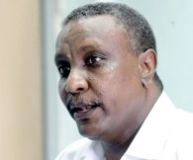North-south Sudan talks fail to reconcile govt partners
November 11, 2007 (KHARTOUM) — Sudan’s government partners have failed to reconcile differences over a 2005 peace deal, with the status of the oil-rich Abyei region dominating the crisis that had prompted one party to withdraw from the coalition government.
 The former southern rebel Sudan People’s Liberation Movement (SPLM) said that a high-level committee set up to try to resolve differences with the dominant northern National Congress Party (NCP) has reached a deadlock.
The former southern rebel Sudan People’s Liberation Movement (SPLM) said that a high-level committee set up to try to resolve differences with the dominant northern National Congress Party (NCP) has reached a deadlock.
“The committee has stopped working,” committee member and SPLM Deputy Secretary-General Yasir Arman told Reuters on Sunday.
He said the committee made a joint decision to end talks and wait for a meeting between SPLM head First Vice President Salva Kiir and President Omar Hassan al-Bashir likely next week.
The SPLM and the NCP signed a landmark deal in 2005 that led to power and wealth sharing and enshrined democratic transformation. But the SPLM complained the NCP lacked the political will to implement the deal and after months of stalemate withdrew from national government.
“We came across very serious difficulties which meant we could not proceed with the committee … the most serious difficulty was Abyei,” Arman added.
“The committee members decided they could no longer work together until further consultations within the presidency.”
U.S. Sudan envoy, Andrew Natsios, had said that the two partners have resolved most of their differences except the status of the central Abyei region and the north-south border, on which Abyei lies.
But Natsios said he was encouraged by constructive and flexible language from both sides after a trip to Sudan last week.
Arman said a deal was still possible, despite the difficulties.
“We are hoping for a solution but it takes two to tango,” he said.
Sudan’s north-south civil war — Africa’s longest — claimed 2 million lives and drove more than 4 million from their homes. Between Khartoum’s Islamist government and mostly Christian and animist southern rebels, it was complicated by religion, ideology and oil.
(Reuters)
